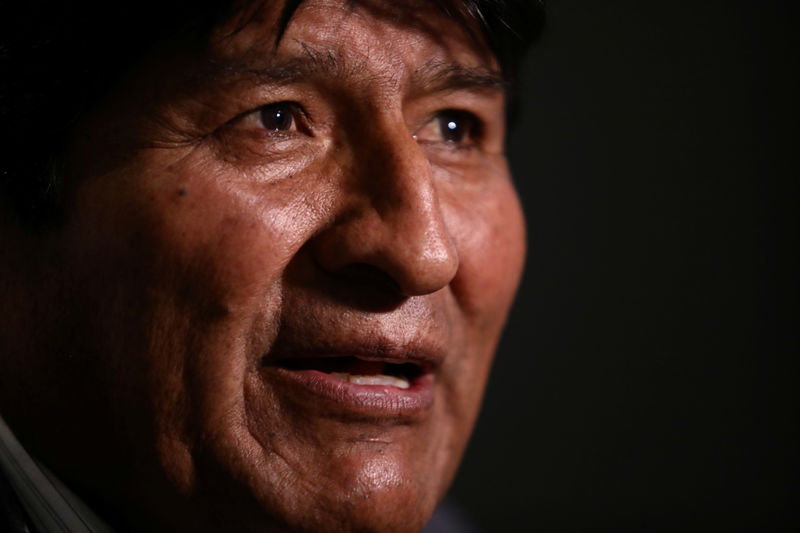By Diego Oré and Frank Jack Daniel
MEXICO CITY (Reuters) - Ousted Bolivian president Evo Morales said on Friday that fresh elections could be held without him, potentially removing an obstacle to choosing a new leader in the South American country thrown into turmoil by his resignation over a contested vote.
The interim government and lawmakers from Morales' Movement for Socialism appear to have reached an agreement this week to hold a new presidential election, following a vote widely seen as tainted that led to his fall.
Interim President Jeanine Anez has said Morales himself would not be welcome as a candidate in the next election.
"For the sake of democracy, if they don't want me to take part, I have no problem not taking part in new elections," Morales told Reuters in an interview in Mexico City. "I just wonder why there is so much fear of Evo."
The fall of Latin America's longest serving contemporary president added to a wave of unrest in the region, including in nearby Ecuador and Chile, where protesters berated leaders over social inequalities.
Striking a conciliatory tone, Morales celebrated the talks with his opponents, saying they were needed to ensure a new government by January, in a time frame established by the constitution.
"That's why the dialog, right and left, is so important," he said, adding he did not know who his party's candidate would be. "The people decide," he said.
The first president from the majority indigenous population of Bolivia, Morales oversaw economic growth in one of the region's poorest nations during almost 14 years in office, a rare achievement in a neighborhood blighted by boom and bust.
The charismatic 60-year-old reduced poverty and gave voice to people who suffered racism and discrimination for centuries. He was hugely popular for years.
But he infuriated many Bolivians by insisting on seeking a fourth term. He resigned under pressure on Sunday after an Oct. 20 election awarded him an outright victory but was tarnished by widespread allegations of fraud.
After the Organization of American States (OAS) declared serious vote irregularities, the army urged him to step down. He accepted asylum in Mexico and was flown out of the country on a Mexican plane. He said he stood down to prevent violence.
The former coca farmer said the U.S. government had also offered a plane.
"The United States had called the foreign minister (of Bolivia) to offer to send us a plane to take us where we wanted. I was sure it would be Guantanamo," he said, smiling.
Supporters say his ousting was a right-wing coup, while detractors celebrate the removal of what they call a "dictator," the last remaining president from the "pink tide" of leftists who won office in Latin America in the early 2000s.
Morales, who is technically still Bolivia's president because lawmakers have yet to formally accept his resignation, suggested he would seek to return home "as soon as possible," once that process was complete.
"I'll come back as a simple party activist," Morales said. "To contribute with my experience, to organize, to mobilize for the campaign."
He was more combative at one point in the interview, arguing his government should complete its constitutional term, which ends Jan. 20.
He said he was in touch with supporters and allies in Bolivia, but that it was impossible for him to organize protests from Mexico, saying unions and groups that back him were not pawns he could order about. Opponents have accused him of stirring trouble from afar.
As the interview wound down, Morales took a call from Greek socialist former prime minister Alexis Tsipras.
Anez said on Friday that Morales was welcome to return home, but that he would have to face electoral fraud allegations and would not be immune from investigation. Morales said he had not committed crimes.
Acknowledging missteps, Morales said social movements had sought to let him stand for a fourth term, but that he perhaps should not have accepted.
Morales lost a referendum on the issue but was permitted to contest for a fourth term following a court decision that argued it was his human right to run.

"It may have been a mistake to accept the referendum," he conceded, but added: "I have always listened to the people."